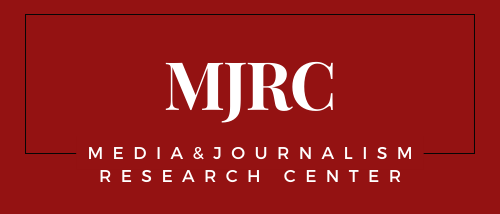The academic journal of the Media and Journalism Research Center (MJRC)
Latest articles
Chen, C.-C., & Chiu, Y.-P. (2026). Cognitive Load, Emotional Asymmetry, and the Third-Person Effect: Explaining Audience Responses to AI-Generated Health Misinformation. Read here
Zhang, S. (2025). Sensitive Prompts and Cultural Contexts: A Comparative Study of AI Chatbots in China and the West. Read here
Dragomir, M. (2025). Anchoring Reality: Journalism’s Struggle for Authority and Societal Reference. Read here
Gross, P. (2025). Toward a Unified European Response to Russian Disinformation: Building a Pan-European Media System and Public Sphere. Read here
Launched in June 2025, New Ideas in Media and Communication is a peer-reviewed, open-access academic journal published by the Media and Journalism Research Center (MJRC). The journal was established as a dedicated space for truly original, forward-thinking research in media, journalism, communication, and related fields—research that not only advances theoretical understanding but also offers practical solutions to the most pressing issues facing the communication landscape today.
A Journal for Original, Applicable Thinking
What sets New Ideas in Media and Communication apart is its commitment to publishing only research that introduces wholly new ideas—not incremental findings or theoretical reiterations, but bold, conceptually innovative work that shifts paradigms or opens entirely new lines of inquiry.
To be accepted, articles must present original contributions that propose new frameworks, methods, models, or conceptual tools, and include a conclusion section containing clear, actionable recommendations for applying these ideas in real-world settings, whether in policy, practice, technology, or education.
The journal’s mission is to close the gap between academic research and practice by prioritizing relevance, applicability, and originality, encouraging scholars to engage not just with academic audiences but with practitioners, regulators, educators, journalists and activists.
Practice-Oriented Peer Review
Each submitted article undergoes a double-blind peer review process, conducted by expert reviewers drawn from MJRC’s international network of affiliated academics. The editorial board includes leading scholars in journalism studies, communication theory, political communication, media policy, and digital media innovation. Peer reviewers assess submissions based on:
- Originality and significance of the core idea
- Methodological robustness and clarity
- Practical relevance and actionable conclusions
- Overall contribution to the field of media and communication
This review process ensures that the journal upholds the highest standards of academic integrity while fostering innovative contributions.
Submission and Style Guidelines
To ensure accessibility to a broad international community of scholars, the journal offers flexible and inclusive submission guidelines:
- Length: Articles must be between 4,000 and 7,000 words, excluding references.
- Language: Submissions are accepted in either American or British English, provided the chosen form is used consistently throughout the article.
- References: Authors are free to use any recognized referencing style (e.g., APA, MLA, Chicago, Harvard), as long as it is applied consistently. The journal accepts both footnotes and endnotes for citations and explanatory notes.
- The peer review process typically takes between two weeks and two months, depending on the depth and complexity of the submission as well as the availability of reviewers with the appropriate expertise. Articles that fail to meet the journal’s core requirement—that is, introducing a genuinely new idea in the field—will be desk-rejected without delay. We encourage authors to put their best foot forward by ensuring their work offers an original contribution before submitting. The decision on acceptance is made through a collaborative, peer-to-peer discussion—not just through isolated online reviews.
Open Access and No Fees
New Ideas in Media and Communication operates on a fully open-access model, grounded in the principle that knowledge should be accessible to all, not gated behind paywalls. In alignment with MJRC’s commitment to equitable scholarship, the journal:
- Does not charge any publication fees (no Article Processing Charges – APCs)
- Does not charge readers or institutions for access
- Publishes all articles under open licenses that promote broad distribution and reuse
This model supports inclusivity and global knowledge-sharing, particularly benefiting scholars, institutions, and readers in underfunded or marginalized communities.
A Platform for Transformation
New Ideas in Media and Communication is more than a journal—it is a platform for redefining the role of academic research in shaping the future of communication. The journal welcomes interdisciplinary approaches and invites submissions from scholars working in media studies, journalism, digital culture, political communication, platform governance, communication technologies, and other related areas.
We particularly encourage proposals that challenge conventional thinking, propose alternative models of media power and governance, media financing models, new forms of communication and social media, or address systemic inequalities in the communication ecosystem.
Who Should Submit?
- Scholars with conceptually innovative research and bold proposals for rethinking media systems
- Researchers offering practical solutions to policy, technological, or ethical dilemmas in communication
- Early-career academics with novel theoretical contributions
- Interdisciplinary authors crossing into media and communication from law, design, education, political science, or technology studies
How to submit
Articles should be submitted via email to mjrc@journalismresearch.org with the subject line exactly as follows: “New Ideas in Media and Communication” SUBMISSION. There’s no need to jump through hoops to anonymize your manuscript—we’ll take care of that on our end before the peer review process begins.
Invest in independent media research and join a community of practice.
Your contribution supports MJRC’s investigations and global analysis. As a supporter, you can receive early access to new findings, invitations to small-group briefings, inclusion in our Supporters Circle updates, and the option to be listed on our Supporters Page.
Contribute to MJRC